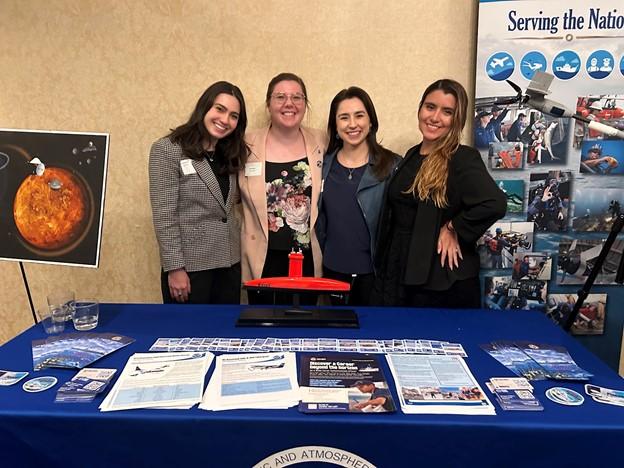
NOAA provides numerous educational and professional opportunities to engage with the public and train the future workforce to enable NOAA science, service, and stewardship. One of those opportunities is the Knauss Fellowship that places highly qualified graduate students in offices throughout the legislative and executive branches of the government to support marine policy decisions affecting ocean, coastal and Great Lakes resources. Get to know the Knauss Fellows from the 2025 cohort in NOAA Marine and Aviation Operations.
Emilia DiBiasio, Budget and Planning Fellow (Ohio Sea Grant)
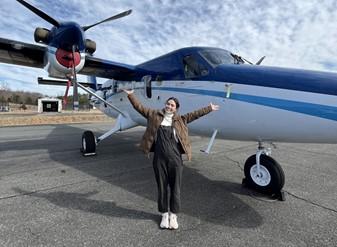
What is your educational/research background?
I earned my master’s in environmental science from Cleveland State University in May 2024. My graduate research focused on evaluating the role of carbon cycle processes during hypoxic events on Lake Erie. Through this work, I conducted field work on the R/V Lake Guardian which provided me my first opportunity to work with federal research vessels like those in the NOAA fleet. As part of my master’s work, I also collaborated with the Carbon and Optics Lab at Cleveland State University to analyze nutrients released from the lake bed and their impact on Lake Erie Harmful Algal Blooms.
Before returning to school for my master’s, I worked for the Ohio River Valley Water Sanitation Commission as a field biologist, with a bachelor’s degree in biology and environmental studies from the University of Cincinnati. My previous research experiences and collaborations with federal, state and local organizations and institutions in Ohio made the Knauss Fellowship a vital next step in my career path.
How do you support the NOAA Fleet?
I am excited to be working at NOAA Marine and Aviation Operations to support budget formulation efforts for the NOAA fleet. As a budget and planning fellow, I get to prepare the office’s annual budget and work with each division to advise and plan for various funding levels that anticipate future requirements of NOAA’s missions. We consider how best to distribute our resources to optimize the needs and priorities of the NOAA fleet. In support of this, we answer questions like, “what would it take to survey two hurricanes at once?”, or “what if we could update all the charts for navigation through all the Great Lakes?”. This year, I am looking forward to advancing the fleet’s missions while navigating the federal budget process.
Caitlin Wilson, Operations Advisor (Delaware Sea Grant)
What is your educational/research background?
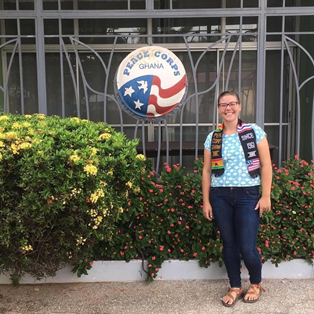
I have a bachelor’s degree in biology from Elizabethtown College and a master’s degree in wildlife and fisheries resource management from West Virginia University. I completed my master’s degree as part of the Peace Corps Master’s International program and was able to serve as a Peace Corps Volunteer while working on my degree. I am currently working on a doctorate in marine policy at the University of Delaware.
As far as research goes, I have conducted both biological and social science research. I conducted research on juvenile lemon sharks, when I studied abroad in the Turks and Caicos Islands during my undergraduate degree. This research focused on the effects of different environmental factors on the presence of juvenile lemon sharks, in Bell Sound, South Caicos. While working on my master’s degree, I started developing an interest in understanding the intersection of natural systems and people through social science research. For my thesis, I interviewed farmers in northern Ghana about their perception of bush burning practices and its impact on vegetation and wildlife.
With my doctorate I am conducting research on coastal communities and the socio-economic impacts of sea level rise and coastal flooding. To do this, I am conducting interviews with members of local governments in the Delaware area, looking at coastal community planning documents, as well as analyzing data about migration rates and coastal disasters.
How do you support the NOAA Fleet?
At present, I am supporting the NOAA Marine and Aviation Operations leadership in maintaining awareness of our aircraft operations. This has involved checking in with the Aircraft Operations Center to see how the various mission flights around the U.S. are going. I help keep track of which planes are flying where or if they are in maintenance. It is especially important as we start to get ready for hurricane season to make sure that our Hurricane Hunter planes have gone through their pre-hurricane maintenance to ensure they are ready to fly when the season starts.
Autumn Moya, Executive Affairs Fellow (Mississippi-Alabama Sea Grant)
What is your educational/research background?
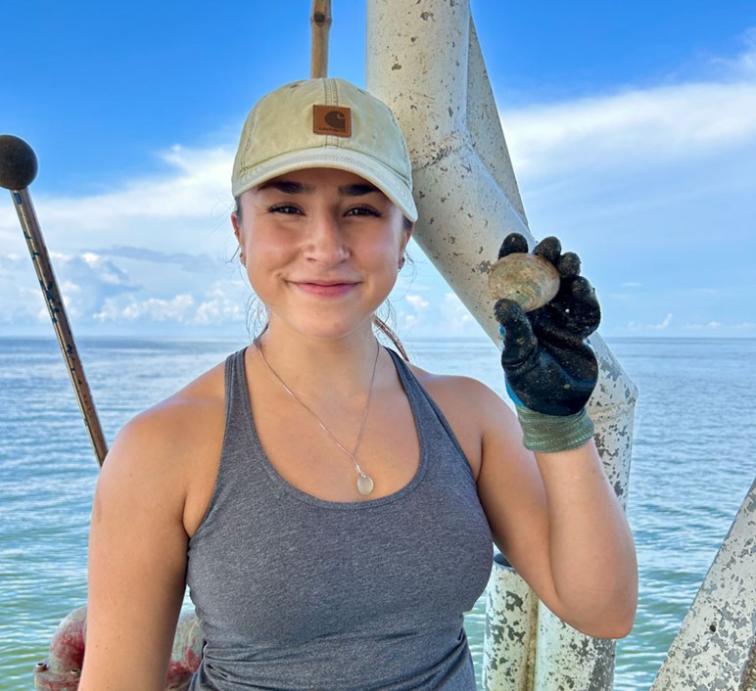
I am currently wrapping up my master’s degree in coastal science at the University of Southern Mississippi, at the Gulf Coast Research Laboratory in Ocean Springs, Mississippi. I am originally from Colorado, and my passion for marine science and policy stems from my undergraduate national student exchange at the University of Hawai’i at Mānoa, where I centered my research around coral reefs and microplastics. After returning to Colorado to finish my bachelor's in biology at Western Colorado University, I decided to continue to pursue my interest in marine sciences and policy at the University of Southern Mississippi, and with the current Knauss Fellowship.
As a graduate research assistant, I am modeling the potential impacts of offshore development on the Atlantic surfclam (Spisula solidissima) fishery with the Science Center for Marine Fisheries. My research is focused on the Northeast U.S. Continental Shelf, where offshore development is projected to overlap with the habitat of commercially important clam species. The research team works to provide data and insights to scientists and policymakers through modeling possible scenarios and solutions.
I participated in a NOAA summer groundfish survey with the Southeast Fisheries Science Center, and completed an internship with the Northeast Fisheries Science Center before starting this fellowship. I also virtually mentored high school students interested in science and social justice with the Our Future is Science program. I have worked with the Hispanic Access Foundation, Colorado Parks and Wildlife, Prince William Sound Aquaculture Corporation, and the National Park Service before starting my graduate studies. I am now thrilled to support the NOAA fleet with NOAA Marine and Aviation Operations.
How do you support the NOAA Fleet?
As I step into the world of marine policy, I have the privilege of supporting NOAA Marine and Aviation Operations as a fellow with the Executive Affairs team. In this role I provide communications, policy coordination, legislative affairs, event management and external affairs support to all of NOAA Marine and Aviation Operations.
Throughout the Knauss Fellowship, I hope to continue collaborating and learning from marine policy professionals and the communities NOAA supports. I look forward to supporting NOAA’s mission to understand and predict changes in climate, weather, ocean, and coasts, to share that knowledge and information with others, and to conserve and manage coastal and marine ecosystems and resources.
Natalia Uribe-Castaneda, Uncrewed Systems Specialist (Florida Sea Grant)
What is your educational/research background?
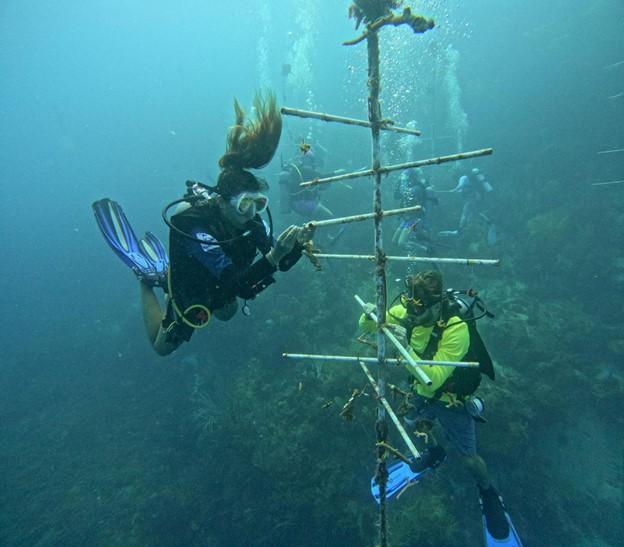
In addition to the fellowship, I am currently completing postdoctoral research on socioeconomic monitoring of the Florida Keys National Marine Sanctuary. I hold a doctorate in interdisciplinary ecology from the University of Florida, a master's in water and coastal management from the University of Bologna, Cádiz and Algarve, and a bachelor’s degree in marine biology from the University of Valle.
My professional, academic and personal journey has been dedicated to leveraging science to empower communities in managing and restoring coastal and marine systems. For the past 15 years, I have focused on the restoration of these systems, uncovering valuable insights through research on how to better support communities in achieving their restoration goals. This commitment has led me to work and study in various countries, including the United States, Colombia, Belize, Peru, Ecuador, Brazil, Honduras, Uruguay, Mexico, Portugal, Spain and Italy.
How do you support the NOAA Fleet?
During my Knauss Fellowship I am serving as an uncrewed systems specialist in the Uncrewed Systems Operation Center. The center provides innovative technologies, highly qualified experts, and dedicated leadership to advance NOAA's missions using safe, reliable and efficient uncrewed systems. Uncrewed systems can enhance the collection and use of critical, high-accuracy and time-sensitive data to meet NOAA mission requirements. In this role I support collaborative efforts across NOAA to make corporate decisions regarding uncrewed systems funding, policy and more.

